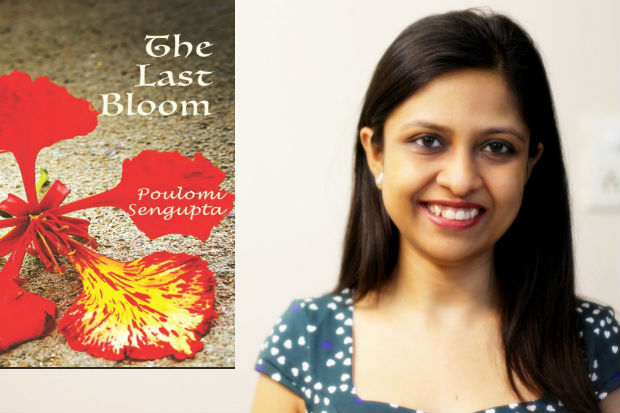Recently we got a chance to read a nice book The Last Bloom. While everyone tries so much to say, there are actually a few who is advocating for the greater good. And this is true to book writing also. While majority of authors are writing to get published and be bestseller, with the sole perspective of getting the most number of copies sold. Well, there is nothing wrong in that as it is a business and at the end of the day every author is writing to get published and earn more readership and money. There are a few who, in addition to this, also think about giving voice to “what is right” to do. And using their creation (book in this case) as a way to convey the message is really good initiative. We must note that it require courage, especially when you are making your debut.
And for that matter we really like and appreciate the book The Last Bloom and it’s author Poulomi Sengupta‘s efforts.
Our unbiased reviews for the book are available here.

Poulomi Sengupta – Author of – The Last Bloom
We are gld for the fact that we got a chance to interview Poulomi Sengupta. We found her a genuine human being with clear and positive thoughts about how a civilization should be nurtured. Accroding to her she is,
An ordinary middle-class Indian girl, voicing her opinion, as a storyteller, trying to create a positive change 🙂
I am an alumna of IIT Kharagpur and Jadavpur University.
Presently working and residing in Mumbai, an author and a bibliophile, I love my share of kickboxing and a colorful dose of oil painting to brighten the apparently mundane life.
Here is the interview session:
Thank you very much!
I had sent the novel manuscript to 10 publishers. I felt that no one may agree to publish it because the storyline is not conventional.
I have been rejected by 9 publishers and Leadstart is the 10th one- to accept the novel.
I am glad that Leadstart considered it worthy and the Head, Malini Nair believed in the storyline and that it could create an impact on the audience of the country.
In fact, the first time I went to Crosswords to see the novel in the racks was exhilarating!
When I went to work in the UK for a year, I found all my fellow Indians discussing how things back home are:
- Why they don’t want to go back home to work
- Why most of them plan to enroll their kids into foreign colleges
- Why they always litter the Indian streets and never the foreign streets
- Why they abide by all the rules outside India and do not feel obliged to do so in the country
- Why they move out of India and that India should change and someone should bring forth into notice that such changes are mandatory
all these discussions made me feel that I am doing nothing to be a part of the change.
Few of the issues like cleanliness and following the rules; they can be done by every citizen. If we educated people do not do these, then why blame the uneducated ones? Each citizen represents the microcosm of our country.
While discussing the impacts of student political activities, agitations and mass movements, especially in colleges of Bengal, all of us felt that such political activities should diminish in colleges, which are primarily meant for education.
That was my deciding point to write the novel.
I have devoured the English and Bengali literature. Russian literature is another favourite genre of mine.
Books that I love reading and can read again and again are:
- The Mahabharata
- The Picture of Dorian Grey by Oscar Wilde
- Gone with the Wind by Margaret Mitchell
A Princess Remembers by Maharani Gayatri Devi.
A vivid and colorful account of the life of an extraordinary woman, epitome of grace and elegance, her transition of lifestyle from the Pre-independence lavish one to the post independent mean position, her struggles, how she dealt with her victories as well as personal losses.
- A Picture of Dorian Grey by Oscar Wilde
- Wuthering Heights by Emily Bronte
- The Prophet by Khalil Gibran
Travelling, trekking and photography
It took me 4 years to write the novel and a full year for editing and proof read.
I mainly wrote from 10 pm to 2 am , that is the prime time when my imagination is at zenith and pen flows the smoothest.
First, I created a matrix for the primary, secondary and tertiary characters and the plots. Dialogue creating was the later stage and description came in the last stage.
I was told in college that ragging teaches to respect seniors, networking and self- confidence.
But I have never seen ragging to shape the above objectives- rather ragging engenders fear of superiors, networking only with selfish motives and loss of confidence.
There are better methods to teach respect, interaction and confidence.
To improve the education system, which in turn profoundly impacts the employment sector, it is necessary that education be given value over politics.
I had written the original manuscript with the subject of Chemisty –as the narrator’s college subject. But while writing I realized that many people are not aware of Geology as a subject. I can assure you that it is one of the mesmerizing subjects that will compel you to fall in deep love with nature. The minerals, crystals, fossils, ores etc.
Also, I felt the need to write about this subject because less job opportunities are available in this subject in India.
Often, we take subjects – not knowing its job opportunities or having interest in the subject.
I feel after talking to many college students, that we barely use our college education in our jobs. Often we are trained again the in the job companies.
Instead, if we are given earlier exposure in college B.Sc level to such things or even after class 12, it will be easy for students to channelize their study subjects in accordance to the work that they will do in future. Also such exposure will allow students to develop soft skills which is at times lacking in them. They mostly learn it on the job.
There is a lack of marriage between the education and industry as a whole; this has been one of the major causes of literate unemployment in India.
What does Vivek represent?
Vivek is the voice of reason in the novel.
He is the only character who is independent of any bondage in this novel.
He is orphan so he has no responsibilities towards his parents,
He is rich so he has no responsibility or compulsion to earn money.
He, by his nature is non-answerable to others for his choices in life, so he is free to do anything and responsible for the consequences of his actions.
Point to be noted that he is elder and much more mature than Priya. He has been through a lot in life- yet he is positive and he takes an important role in keeping Priya positive to face the situations in her life.
Also, he is unperturbed by many things around him. Since he knows that there is order in the chaos, so if given time, the chaos will subside after a while, he lets time do its action without thinking too much about the chaos and concentrates only on his actions.
What does Suvo represent?
Suvo is the prototype of the master politicians in the country.
He is well gifted with his education and he understands that he can, with his leadership skills and his style of schooling, easily become the hero of the masses, who have never availed good educational facilities. He chooses his gifts to manipulate others, to manipulate relations, to utilize things in his favor.
He chooses to play with the emotions of his classmates to win college elections.
He has no value for love, friendship and relationships.
Just like many politicians- who have availed convent and English education and they have been the pioneers of removal of English at the elementary education stage in the educational system of Bengal, Suvo in the similar manner- uses his educational excellence to wield power on the other classmates who lack leadership and are well smitten by his English skills, smartness and leadership skills.
What does Priya represent?
Priya represents the voice of change.
It is especially denoted by the changing way of the narrative. Each experience changes the feelings, reactions, maturity level and narrative style of the protagonist.
What does Aashi represent?
Aashi’s character represents the true rebellion.
She is the sole rebel- alone, strong, loud voiced, loud mouthed, expressing her opinion when all are silent yet feeling the
same things but have no courage to voice their opinion.
She, being the only rebel, is naturally hated, ousted and spoken ill about.
She does not conform to the norm of the place and adjust to its requirements.
What does Keya represent?
Keya represents a conformist mentality.
She is well gifted with her education to bring about changes which Priya, Vivek, Aashi and Renela stand for.
She wants to live as the society dictates. She thinks very deeply about what judgments others have about her and wishes to please others always.
For her, it is important that she is spoken well of, that people refer to her as a well- charactered girl. She wishes to portray herself as a good girl conforming to the rules of others.
She lets go of her three friends when Renela is in trouble due to her relationship with Gautam, since the majority of the crowd is sympathizing with Gautam and not Renela.
What does Priya’s father represent?
Priya’s father represents an average middle class Indian who has very low acceptance of uncertainty.
He has fear of law and respect for the rich.
He values stability over the courage to take risks.
He has worked for his whole life only to repay his house loan and child’s education,
He thinks sarkari naukri is the key to happy and contended life.
He believes in hard work and values the hardworking.
What does Priya’s mother represent?
(We would like to explore your vision about her, as the character appears for only a few scenes but it spreads the wisdom nicely, it resembles to a typical middle class Indian mother; who may not have explored the material world, but can prove the best teacher in the world.)
Priya’s mother is patient, articulate and strong. She is a middle class woman who wants the best for her child as well as for other children.
She represents Wisdom of age.
The wisdom of silent understanding over noisy altercation.
The wisdom of patience over haste.
The Mother senses the Change of time and gives Priya the courage to voice her opinions, which the mother may not have voiced. At the same time, she advises Priya to be balanced in voicing opinions because for each one, the situation may be different and each is a product of his/her situations.
It represents sacrifice. In the chapter ‘Last Bloom’ Priya mentions the flowers. Pedestrians smash the flowers as they walk over the thoroughfare.
The Gulmohr represents the sacrifices of the middle class-
The sacrifice of extraordinary, to be follower of morale and law
The sacrifice of uncertainty to seek stability of lifetime
The sacrifice of risks of finding in love for the stability of a known arranged companionship
The sacrifice of leisure or vacation for having money hoarded for emergency purpose
The sacrifice of honesty for the fear of being a scapegoat.
I was not aware of the marketing scenario – it has been my Project Manager, Uzair Thakur, who has educated me on the different marketing strategies of the novel. I am still learning.
I have never considered a trailer but I am open to ideas and would love to launch one.
It may broaden the reach of the novel to the audience exponentially.
- Keep the streets clean (no SWACCH BHARAT is required for that). It is surprising that the same people who go to Europe and US never litter the roads there but here they smartly litter the streets knowing that no one will stop them or they will not pay any fine for it.
- Do not piss in public places. It is our country, we can all strive to keep it clean. No political class intervention, prime minister or opposition support is required for such basic civic sense.
Few Fundamental duties are as follows:
- To value and preserve the rich heritage of our composite culture; (stop marking on monuments and littering in the heritage sites.)
- To protect and improve the natural environment including forests, lakes, rivers and wild life, and to have compassion for living creatures; (stop poaching, stop littering the streets, stop spitting in public)
- To safeguard public property and to abjure violence; (during the boycotts, do not damage public property- it brings no solution)
- I had planned the present novel on the politicization of higher education of the country.
- The plot of the second one is based on the employment and conditions of private and public sector workers in India and why people prefer to work abroad.
- The third one is based on the transition of thought process about romance from the past to the present generation.
The idea behind incorporation of fundamental duties was to remind the citizens of the country that they have certain obligations towards the country and society.
As the state offers them fundamental rights, it is the fundamental duty of each citizen of India to further national integration and contribute towards a better society. There is a major difference between the fundamental rights and the fundamental duties.
The fundamental duties are non-justifiable, that is no one can be punished in case of their violation or non-compliance.
The problem is that nothing comes into existence if not made mandatory.
So, few can be made mandatory.
At least the littering of roads can be made punishable by fine. Also breakage of public property should be heavily fined.
I am pleasantly delighted with the consideration that my novel can be made into a movie.
In fact, my publisher gave me the confidence that it is potent enough to be reeled into a motion picture.
Living in the moment is my motto, so I will think about the cast after the deal is sealed 🙂
Thank you very much for the compliment.
While writing “The Last Bloom“, I had a trilogy in mind.
All above are in the form of one centralized theme of a love story.
Realistic fiction is my genre.
I will stick to that because it gives me the power to use my imagination.
So, not considering non-fiction at all.
No, I am not interested in politics.
A career in politics is not at all a pre-requisite to serve the nation.
Currently, I am embarking on a career in Public Policy.
My main focus will be on education policies and strategies, that shape the future of the students.
I hope to make a difference in the lives of the present students and their careers.
Kindle Edition | Amazon India
Paperback | Amazon India
Kindle Edition | Amazon.com
Paperback | Amazon.com
Twitter: https://twitter.com/poulomisngpta
FaceBook: https://www.facebook.com/Poulomi-Sengupta-829114410533666/
We hope that you have enjoyed the interview session, may be even more than us 🙂
Do you have any other questions for her? Which other authors you like us to interview for you? Do let us know your thoughts and remarks via comments below. Do not forget to share this article with your friends over various social networks via Twitter, Facebook, Google Plus and others. And yes, you may like to subscribe to our RSS feeds and follow us on various Social networks to get latest updates for the site to land right in your mail box.
 ThinkerViews – Views And Reviews Personal views and reviews for books, magazines, tv serials, movies, websites, technical stuff and more.
ThinkerViews – Views And Reviews Personal views and reviews for books, magazines, tv serials, movies, websites, technical stuff and more.



